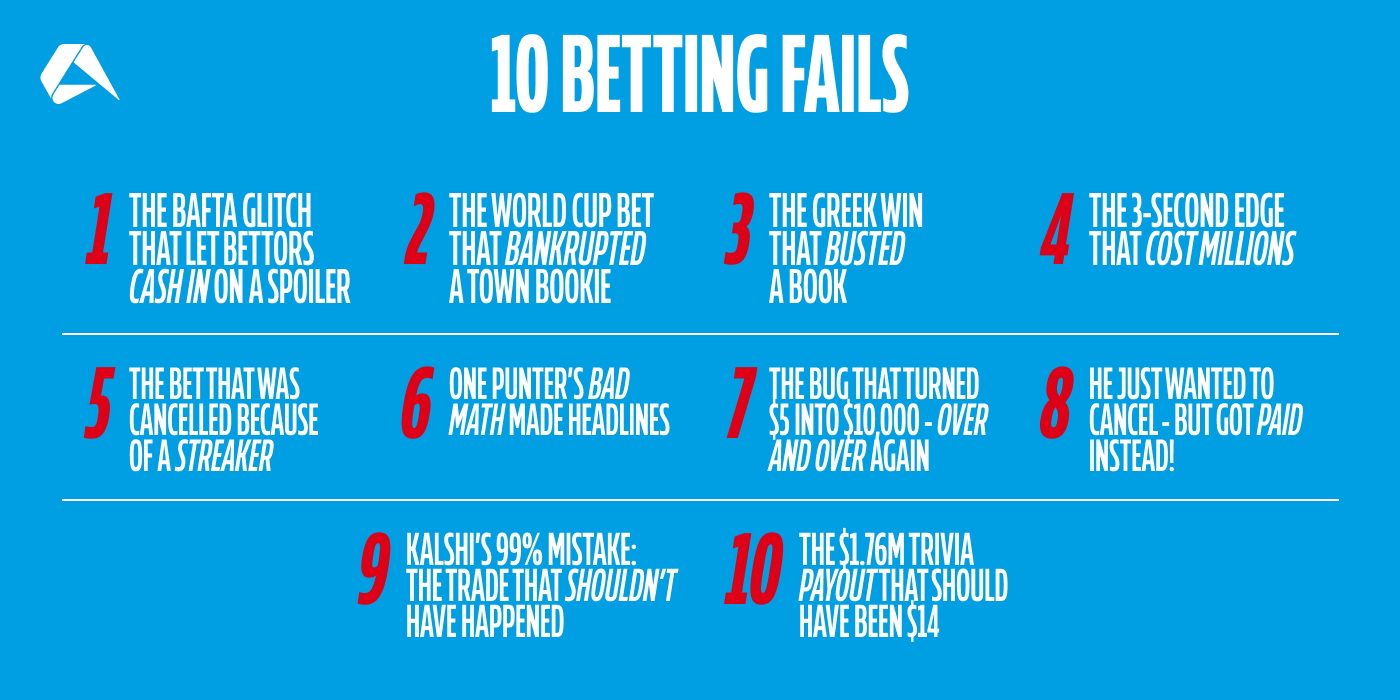Overview 10 Real Betting Incidents That Prove No Platform Is Bulletproof
Seeking true sports betting insights? This essential summary explores 10 real betting incidents that demonstrate why no sportsbook platform is bulletproof. These fascinating stories expose the critical blind spots, high-stakes edge cases, and unexpected human habits that routinely catch even experienced operators off guard.
Discover how catastrophic longshots, such as Greece winning Euro 2004, created massive seven-figure liability events, and how localized enthusiasm bankrupted a town bookmaker during the 1994 World Cup. The incidents reveal serious vulnerabilities, ranging from a BAFTA broadcast delay that allowed early social media watchers to exploit open odds, to the three-second data delay advantage used by courtsiders to make millions in live tennis betting.
Furthermore, the blog highlights the limits of automation—such as a system failing to distinguish a streaker from a tactical substitution—and catastrophic design flaws, including a mobile app refund bug that created a loop of free money. These examples underscore that even small accounting glitches or faulty UI logic can lead to massive financial exposure. Operators must rely on strong internal checks and resilient iGaming software to protect against these low-likelihood, high-liability threats.
Behind every big win or loss is a system under pressure. Find out how even small oversights can have massive impacts. Read the blog below for details.
You’ve seen it all, right? Big wins, bad beats, bizarre bugs. If it happens in a sportsbook, chances are you’ve already dealt with it, fixed it, or filed it under "one for the bar."
But just when you think nothing can surprise you, a few stories still manage to raise an eyebrow, or spark a Slack thread titled "Wait, can this be true?"
From the town that bet itself broke to when a naked fan froze the market, these aren’t just strange stories. They reveal the blind spots, the edge cases, and the human habits that still catch even seasoned operators off guard.
So here they are: 10 facts about sports betting that might surprise you, and the myths or strategic truths they quietly expose.
Let’s see how many you already knew.

1. The BAFTA Glitch That Let Bettors Cash In on a Spoiler
At the 2025 BAFTAs, one sportsbook made a critical oversight. As incredible as it may sound, it posted live markets based on the UK’s delayed TV broadcast, not the actual event timing.
That meant when a surprise winner scooped Best Original Screenplay, a +350 long shot, early watchers on social media already knew the result while the odds remained open for over two hours.
A handful of savvy bettors jumped in and, to their surprise, the sportsbook honored the bets, paying out and closing the market only after catching wind of the error. It wasn’t a huge event, but the liability wasn’t small either.
Heads-Up
Award shows aren’t live for everyone — but Twitter is. If your markets aren’t synced to reality, your traders won’t be either.
Smart Bet: If it’s not broadcast in real time, treat it like a recorded event or don’t price it at all.
2. The World Cup Bet That Bankrupted a Town Bookie
A sleepy Irish town once lit up when locals piled onto Ireland to score the first goal at 100/1 odds in the 1994 FIFA World Cup. When Ray Houghton struck in the 12th minute against Italy, the odds paid out big, and the local bookmaker imploded. Betting volume was small, but tied to high odds and regional enthusiasm, it was enough to push one small bookie into insolvency.
What Everyone Missed
There’s a myth that regional long shots are financial non-events due to low volume. But localized sentiment betting, especially when funneled through a single operator, can be dangerously concentrated.
The Real Risk: Sentiment scales faster than your models.
3. The Greek Win That Busted a Book
Here’s one you might remember. At the start of Euro 2004, Greece weren’t just underdogs, they were written off entirely. Priced at 10,000/1 by some bookmakers, they weren’t expected to make it out of the group stage.
But they did. Then they knocked out France. Then the Czech Republic. And then, astonishingly, they beat Portugal in the final, triggering one of the biggest liability events in football betting history. Some books paid out seven figures on just a handful of small-stake bets. One famously paid over £7 million to just 50 customers.
The payout dwarfed the incoming handle. Most operators hadn’t even hedged it. After all, who bets on Greece to win the whole thing?
Not Just a One-Off
Another common misconception is that long shots don’t pose real risk, especially when the ticket count is low. But all it takes is a few optimistic bettors and a big enough “what if” to land a blow (think Leicester City's Premier League 2015–2016 win widely available at 5,000/1).
Smart operators still hedge on long shots. Not because they expect them to win, but to make sure there’s a limit on how much they’d have to pay if they do.
Hard Truth: The riskiest bets are sometimes the ones you don’t take seriously.
4. The 3-Second Edge That Cost Millions
Within the space between legality and edge in live tennis, a syndicate called Sporting Data made millions. They didn’t fix matches or bribe players. They just saw the point before anyone else did, and bet accordingly.
To achieve this feat, they used courtsiders in stadiums to transmit point scores faster than TV feeds, while betting algorithms lagged. Betfair’s delay was five seconds, but courtsiders typically had the score within two, giving the syndicate a three-second head start on every point. Over time, even tiny odds mispricing added up. As one insider put it: “We broke a million.”
The Delay They Counted On
There’s a common misunderstanding that data delay is negligible, but for high-speed bettors, every half-second counts. Without latency controls or feed integrity checks, your live lines can become vulnerable to exploitation by bettors. Your lines don’t need to be wrong, just slow enough for someone faster to take advantage.
One to Remember: When your data lags, so does your control. And sharp bettors exploit the gaps.
5. The Bet That Was Canceled Because of a Streaker
This one’s real, and it made its way into more than one risk team’s “what just happened?” folder.
During a live football match, an in-play betting market was suddenly suspended by the sportsbook’s automated trading system. The reason? A streaker had run onto the pitch. The system flagged it as an “unauthorized player event,” using the same logic as when markets are paused for red cards, injuries, or pitch invasions by fans (as reported by Front Office Sports in February 2021), with the intent to disrupt play.
Markets froze. Trading stopped. And while the operator avoided taking liability in a chaotic moment, it also exposed something awkward: that automation cannot distinguish between a tactical substitution and a naked person with a smoke bomb.
Where It Went Wrong
There’s a tendency to believe that once trading logic is automated, it also handles edge cases. But streakers, crowd interference, and other irregular disruptions live in the gray zone. This event highlights the reality that even AI requires common sense, which ultimately stems from human oversight and judgment.
The Sharp End: Automation handles most of the game, but the weird stuff still needs a human in the loop.
6. One Bettor’s Bad Math Made Headlines
As widely discussed in sportsbook forums, a high-roller once placed a £5,000 bet on odds of 1.01, thinking he was getting a 100/1 shot. He wasn’t. The decimal odds format confused him, and the return was just £50. And worse, the bet lost.
The screenshot went viral, sparking a mix of sympathy and mockery. But behind the meme was something operators often overlook. Not everyone understands decimal odds formatting, especially in high-stakes or emotional betting moments. Decimal odds may be clearer on paper, but in practice, they still trip people up.
What to Watch For
There’s a common belief that decimal odds prevent confusion. However, for less experienced users or bettors switching from fractional formats, familiarity with the format cannot be assumed, even for high-stakes bets.
Operator Tip: Display format isn’t just cosmetic. It’s a trust factor.
7. The Bug That Turned $5 Into $10,000 - Over and Over Again
Back in 2009, a glitch in a GameKing video poker terminal allowed players to do the unthinkable: retroactively change their bet size after winning a hand.
Two players discovered it and exploited it across several casinos. And what was their trick? They’d place a tiny bet, win a hand, and then switch the denomination to the highest amount possible before claiming the payout. Suddenly, what should’ve been a $5 win became a $10,000 jackpot.
The case gained traction after it was investigated by regulators and reported by Wired and other industry outlets. They were eventually caught and prosecuted, but not before raking in hundreds of thousands, possibly millions, in manipulated payouts.
What Broke the Bank?
To be fair to the players, it wasn’t fraud in the usual sense. It was flawed UI logic and a lack of a safeguard for sequence order. The system allowed input changes after confirmation of the result.
Sharp Tip: Test every win as if it were rigged before someone else does.
8. He Just Wanted to Cancel - But Got Paid Instead!
It started with a single tap. Then another. And another. By the fourth, the bettor’s account balance had surged by more than $2,000, and all from canceling the same wager.
So what happened? As reported by bettor Rishard101, the incident occurred on an unnamed sportsbook mobile app. A UX flaw in the sportsbook’s app allowed the “cancel bet” button to trigger a refund each time the player pressed it. There was no lockout, no safety net, just a loop of free money for every impatient click.
The incident first surfaced on Reddit’s r/sportsbook forum, where users warned the bug could be catastrophic if abused at scale. One developer went as far as to call it “death by debounce.”
How It Slipped Through
It’s worth noting that this wasn’t a hacker or fraud ring. It was a regular user who exploited broken logic by mistake. Multiply that by thousands of users with laggy connections and itchy fingers, and your refund function becomes a payout engine.
A Lesson Worth Repeating: Design flaws don’t need hackers to drain your wallet.
9. Kalshi’s 99% Mistake: The Trade That Shouldn’t Have Happened
If a tap-happy refund bug seems costly, wait until you hear about a mispriced political contract that nearly turned a typo into a six-figure windfall.
At first glance, it looked like any other day on Kalshi’s trading floor. The regulated prediction exchange, which allows users to trade outcomes of real-world events, recently launched a new market for Major League Baseball. Traders could buy contracts on whether certain teams would win a set number of games, priced between 1¢ and 99¢ depending on perceived likelihood.
But then, something unexpected happened.
One user began buying contracts at 99¢, the highest possible price, on teams with no real chance of hitting their win targets. In other words, they were betting as if the result was guaranteed, and they were paying near certainty-level prices for it. Even Kalshi’s own algorithms reportedly flagged the trades as “unusual,” yet the contracts continued to execute.
By the time staff intervened, the trader had placed enough mispriced orders to create a $162,000 exposure for the exchange.
What Went Wrong
Was it a trading input error? A copy/paste slip? Fat fingers? Kalshi never confirmed, but they acted quickly once it was outed. The exchange voided or refunded the affected trades and issued a statement explaining the event, thereby protecting counterparties from an unearned windfall and shielding itself from a financial disaster.
And while Kalshi isn’t a traditional sportsbook, this story resonates deeply with any operator who relies on live markets, pricing logic, and automated execution.
Lesson: Mistakes on regulated platforms aren’t rare. They’re just expensive.
10. The $1.76M Trivia Payout That Should Have Been $14
Some trivia nights end in bragging rights. This one ended in a $1.76 million accounting error for the unfortunate operator, who accidentally credited 353 Live Trivia winners $5,000 each, instead of the usual $14 average payout. That resulted in a total erroneous payout of $1.76 million, all because a calculation glitch multiplied the full prize pool by each player.
To their credit, instead of clawing back, the operator elected to let the awards stand.
What Wasn’t Considered
Operators often assume prize pools, especially those like free-play trivia, carry negligible risk. However, when misconfigured logic credits are fully rewarded to every qualifier, small-stakes games can become million-dollar liabilities in seconds.
Don’t Let This Happen to You: Autocalculation needs oversight, or you’ll be automating the loss.
Just One More Before You Go?
Bonus Fact 11: The Story of The Most Expensive Sportsbook Bug You’ve Never Heard Of
It was the kind of flaw that ruins reputations — if anyone ever saw it. In early 2025, while finalizing a microbetting update, Altenar’s sportsbook QA team uncovered a rare timing bug. Under specific server conditions, a canceled bet could still trigger a payout. In one test scenario, the same wager paid out twice, once through the normal flow and again through the fallback. Total theoretical exposure? Well into the hundreds of thousands.
But here’s the twist. The bug was caught before release. It never reached a player. Never made the news. And that’s the point.
The Best Tech Stories Never Make the News
To the company’s credit, the discovery wasn’t a matter of luck, but rather by design. Altenar had been rewriting its internal checks to prevent exactly these low-likelihood, high-liability errors. They later hinted at the logic in a blog post titled ‘The Silent Heist Operators Never See Coming.’
The moral of this story is this. You don’t know most of the bugs you keep from your customers. That’s why the quality of your iGaming software matters, and why Altenar builds features so you’ll never headline them.
Great software doesn’t just scale, it protects. Book your personalized sportsbook demonstration today to see how Altenar engineers resilience into every feature













